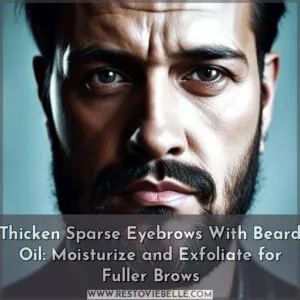This site is supported by our readers. We may earn a commission, at no cost to you, if you purchase through links.
 Fed up with your scraggly beard? Fear not, gentlemen, as coconut oil for beard care can be the way to go for a full and healthy mane. This wonder of nature will take your face fur from dull to brilliant.
Fed up with your scraggly beard? Fear not, gentlemen, as coconut oil for beard care can be the way to go for a full and healthy mane. This wonder of nature will take your face fur from dull to brilliant.
You will find out how coconut oil moisturizes, enhances growth, and untangles whiskers. Learn how to use it to its full potential in maintaining and growing the optimal beard.
Master beard care with this versatile oil and be in total control over your facial hair destiny. Get ready to unleash your truly remarkable beard.
Table Of Contents
Key Takeaways
- Coconut oil is the Swiss Army knife of beard care – it moisturizes, promotes growth, and even helps tame that pesky beard itch. Talk about a triple threat!
- Applying this tropical elixir is easier than falling off a log. Just warm it up, massage it in, and let your beard soak up the goodness. It’s like sending your facial hair on a mini-vacation to the Bahamas!
- Not all heroes wear capes – some come in jars. Coconut oil can rescue you from beard dandruff, split ends, and even act as a wallet-friendly alternative to fancy beard oils.
- While coconut oil won’t turn you into a lumberjack overnight, it’ll definitely help you put your best beard forward. Just remember, a little goes a long way – unless you want to look like you’ve been wrestling with a coconut cream pie!
Benefits of Coconut Oil for Beards
You’ll find coconut oil offers multiple benefits for your beard, including moisturizing both hair and skin, promoting healthy growth, and reducing irritating itch. By incorporating this natural oil into your grooming routine, you’re giving your facial hair the nourishment it needs to look and feel its best.
Moisturizes Beard And Skin
You’ll love how coconut oil transforms your beard and skin. It’s a powerhouse moisturizer with anti-inflammatory and antibacterial properties.
Say goodbye to dry, flaky skin beneath your facial hair. This natural wonder penetrates deep, nourishing both your beard and the skin underneath.
It’ll leave your mane soft, manageable, and itch-free. Plus, it helps strengthen hair and improve scalp health, potentially reducing dandruff.
Your beard’s about to get a whole lot happier!
Promotes Healthy Beard Growth
With the moisturizing effects, coconut oil conditions beards to facilitate growth. It prevents breakage and reduces inflammation that would hinder your facial hair from growing out. The antibacterial properties keep the environment clean around the beard to set up the right atmosphere for growth. Moreover, it enhances shine so that your beard looks full. Here is how coconut oil works for the health of our beards:
• Strengthens beard strands
- Protects against environmental damage
You’ll notice a fuller, more vibrant beard in no time!
Reduces Beard Itch
Coconut oil’s anti-inflammatory properties can work wonders for your itchy beard. It soothes scalp irritation and tackles beard dandruff, making your facial hair journey more comfortable.
By reducing inflammation, you’re creating an ideal environment for hair growth. Say goodbye to constant scratching and hello to a healthier, more manageable beard.
With coconut oil, you’re not just treating symptoms; you’re addressing the root cause of beard itch.
How to Use Coconut Oil on Your Beard
Now that you know all about the benefits of coconut oil, let’s get to the interesting part—how to use it on your beard. Using this natural elixir isn’t difficult at all, but there are some important things to remember:
- Warm a small amount between your palms to liquefy it
- Gently massage into your beard and skin, starting from the roots
- Comb through to ensure even distribution
Leave it on for at least 30 minutes or overnight to deep condition it.
You get the best out of coconut oil if you use it 2-3 times a week. Also, be sure to keep your coconut oil in some cool and dry place to really help in preserving its quality. Additional safety precautions are very minimal, but always conduct a patch test if you have a very sensitive skin type. With regular application, you’ll soon feel that your beard is getting softer, more manageable, and healthier-looking. It’s like sending your beard on a mini-vacation to the tropics!
Effect of Coconut Oil on Beard Growth
Now that you have read how to put coconut oil in your beard, let’s discuss how it benefits beard growth. You’ll be more than delighted to know that coconut oil can do magic to your facial hair. It gets easily absorbed into the beards due to some very special properties that nourish the hair and the skin—its promotes healthier growth and health for the scalp, too.
The antimicrobial properties of coconut oil help in the prevention of dandruff so that your beards are flake-free and comfortable. This is great for hair strengthening, diminishing random breakage, and promoting fuller growth. Plus, it repairs split ends and maintains your beard looking neat and tidy.
While coconut oil won’t be miracles for your patchy beards, it enhances the overall appearance and feel of your facial hair. With time, you’ll realize that the growth is softer, shinier, and more manageable.
Coconut Oil for Beard Maintenance
Now that you know how coconut oil can enhance beard growth, let’s talk about its role in beard maintenance. You’ll find this is basically a game-changer for any grooming routine out there.
It works as an organic conditioning agent for your beard, greatly softening coarse facial hairs. Say goodbye to the scratchy, wire-brush feeling! It’s also your secret weapon against beard dandruff, by keeping the skin underneath moisturized and flake-free.
Struggling with split ends? Coconut oil will help to repair your beard and its breakages. The best of all is its great ability as an alternative for beard oil that won’t necessarily break the bank.
This tropical elixir on its own can keep your fuzz looking lush and your facial hair feeling smooth throughout the day. Ready to take your beard game to the next level? Coconut oil shall move you into mastery over this.
Frequently Asked Questions (FAQs)
Is coconut oil suitable for all beard types?
Coconut oil isn’t one-size-fits-all for beards. Your beard type matters. If you’ve got dry, coarse hair, it’s a game-changer. For oily or fine beards, you’ll want to use it sparingly. Test it out!
How often should coconut oil be applied to beards?
You’ll want to apply coconut oil to your beard 2-3 times a week. If you’ve got dry skin or hair, bump it up to daily use. Adjust based on your beard’s needs and how it responds.
Can coconut oil cause beard dandruff or irritation?
While 60% of men experience beard irritation, you’re not doomed to discomfort. Coconut oil can potentially cause dandruff or irritation if you’re sensitive to it. Always patch test first and use sparingly to avoid clogging pores.
Whats the difference between refined and unrefined coconut oil?
Refined coconut oil’s processed to remove impurities and scent, resulting in a neutral flavor. Unrefined oil retains its coconutty aroma and more nutrients. You’ll find refined better for high-heat cooking, while unrefined’s ideal for low-heat or raw applications.
Does coconut oil help with beard itch and flaking?
Like a soothing balm for a restless forest, coconut oil can tame beard itch and flaking. You’ll find relief as it moisturizes your skin and softens your facial hair. It’s a natural solution that’ll keep your beard comfortable.
Conclusion
Who knew that the key to a majestic beard was hiding in your kitchen cupboard? Coconut oil for beard care is a game-changer.
You’ve learned how it moisturizes, promotes growth, and tames unruly whiskers. By incorporating this natural wonder into your grooming routine, you’ll transform your facial hair from lackluster to luxurious.
- baldingbeards.com
- luxuryshavingrazors.com
- beardoholic.com
- beardorganics.com









